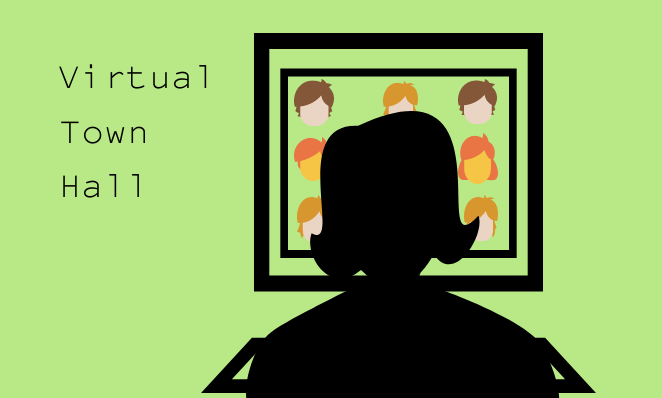Virtual town hall addresses COVID-19-related student concerns
MCPS hosted a virtual town hall April 21.
April 24, 2020
Montgomery County councilmember Tom Hucker and county council candidate Lynne Harris co-hosted a virtual student town hall April 21 where student leaders voiced their concerns for the rest of the school year and shared how their organizations are moving forward through the COVID-19 pandemic.
During the town hall, Student Member of the Board Nate Tinbite provided a timeline for the county’s newly-announced pass/incomplete grading policy for the fourth marking period and described its implications.
“The reason why they went with that framework is because with an incomplete, it’ll trigger a plan and timeline for opportunities to resume learning, meet curricular requirements, and meet a grade pass credit in the course,” Tinbite said during the town hall.
Due to the COVID-19 outbreak, members of the Montgomery County Regional student government’s special elections committee took the time to address the upcoming SMOB election, specifically on the process of at-home voting, which will replace the traditional in-school format. MCR officially moved the election from its original date, April 22, to May 20 following concerns over the pandemic.
“Our special elections committee and our advisor Mrs. Cherry have worked really hard to make sure that the integrity of the election is maintained and is secure and equitable as possible,” Helena Aytenfisu, a member of the Special Elections Committee, said.
Various student-led organizations used the town hall to explain how they will continue to further their causes in such tumultuous circumstances.
“We have really prioritized that community aspect of our group; we’ve created a program called MoCo Pride Speaks Out While Inside,” MoCo Pride organizer Uma Fox said. “Every week, we have an opportunity for students to come together for something either fun or informative. Last week, it was a documentary about intersectional activism in the 1960s that students could watch together virtually.”
Fox explained the importance of keeping members of the LGBTQ+ community connected, even if only through screens, due to the high rates of LGBTQ-identifying students who feel uncomfortable expressing themselves around their families, she said.
Other attendees also raised questions about chromebook distribution, primary school education and the importance of involving students in crucial community discussions throughout the pandemic.
“The crisis will be over, the health emergency will end whenever the governor says it will, and we’ll have a historic recession after that, and we’ll have inequities that persist,” Hucker said. “And you all are part of the solution.”










